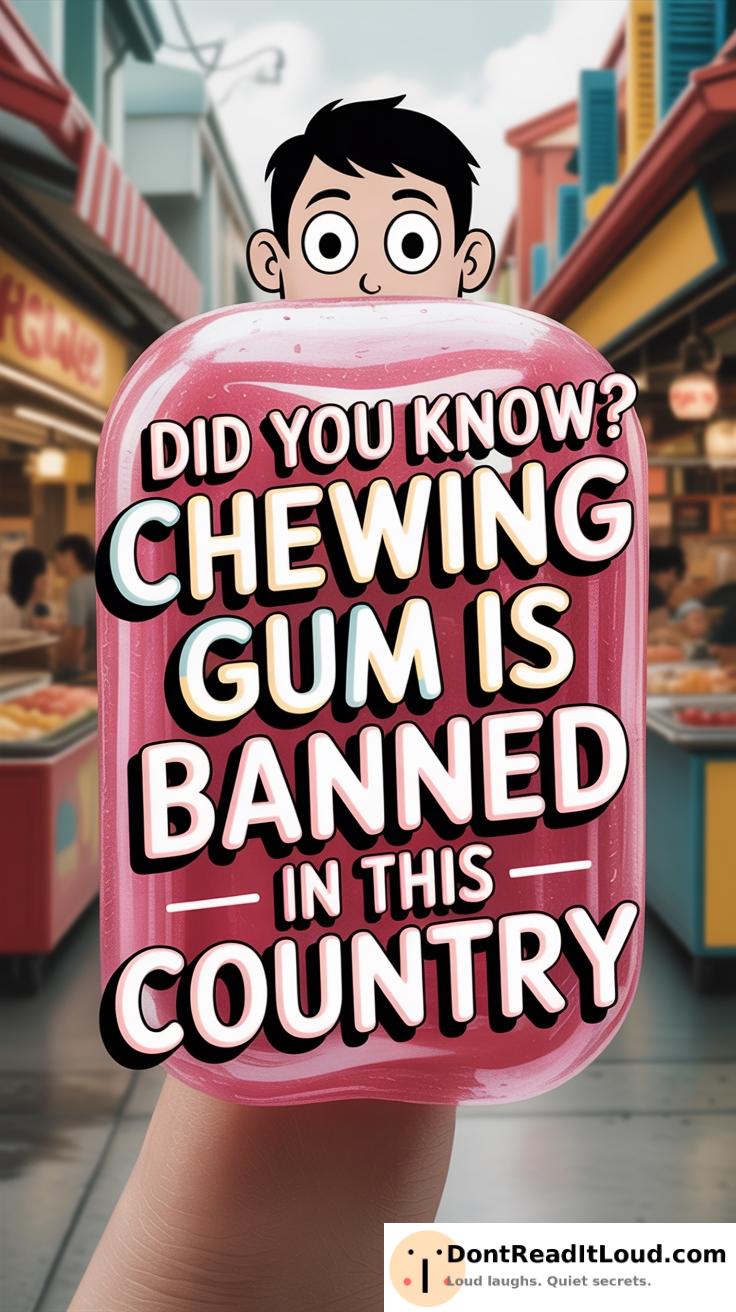
Did you know chewing gum is banned in Singapore? This rule began in the early 1990s due to gum litter and problems on public transport. It shows Singapore’s strong focus on cleanliness and civic responsibility. Getting caught can result in a significant fine. Want to learn how this unusual law started and what it means for locals? Explore Singapore’s strict but effective approach to maintaining public order.
The Origin of This Law

The ban on chewing gum in Singapore began in the early 1990s as a response to problems caused by discarded gum. The law was introduced in 1992 as part of the government’s broader efforts to keep the city-state clean and orderly under Prime Minister Lee Kuan Yew.
One major reason for the ban was the high cost and difficulty of cleaning gum litter from public places. Gum often ended up stuck on sidewalks, benches, and public transport, creating a mess that was hard to remove.
For example, gum placed on MRT train doors caused malfunctions and service delays, highlighting the need for tougher rules.
Singapore also wanted to present a clean and modern image to attract tourists and investors. Leaders saw a spotless city as important for the country’s growth and international reputation.
The gum ban became a symbol of Singapore’s strict regulations and focus on public cleanliness. Although the law now allows some therapeutic gums, the original ban still stands as a notable example of Singapore’s distinctive approach to city management.
Why This Law Exists

The ban on chewing gum in Singapore is grounded in both practical and cultural reasons. Introduced in 1992 under Prime Minister Lee Kuan Yew, this law was part of a broader initiative to keep the city-state clean and orderly. Singapore’s reputation for strict regulations supports its goal of being a tidy, well-managed urban environment, and the chewing gum ban is a key part of this strategy.
On a practical level, the law targeted problems caused by careless gum disposal. Before the ban, gum was often found stuck to public spaces like sidewalks and trains, creating costly cleaning and maintenance challenges. The government responded by banning the import, sale, and possession of chewing gum to eliminate these issues.
Culturally, the ban reflects the Singaporean government’s focus on discipline and shared responsibility. It fits with the country’s values of respecting public spaces and emphasizing civic duty. By upholding the ban, Singapore highlights the impact of individual behavior on the community’s well-being.
Politically, keeping the chewing gum ban in place demonstrates the government’s dedication to its founding principles. This law symbolizes Singapore’s proactive approach to safeguarding its image and maintaining its reputation as one of the world’s cleanest cities.
How This Law Reflects it’s Culture?

Chewing gum is banned in Singapore, a rule often seen as a sign of the nation’s dedication to cleanliness and order. This law fits well with Singapore’s cultural values, highlighting the importance of a tidy and efficient city.
Singapore is famous for its strict regulations, which help create a high quality of life and keep public spaces clean. The ban, introduced in 1992, addressed problems caused by discarded gum littering sidewalks, buses, and trains.
By stopping gum sales and imports, the government aimed to solve this issue and preserve the city’s spotless image.
This rule shows Singapore’s focus on discipline and respect for shared spaces. The country’s quick rise to a global hub owes much to rules that encourage harmony and efficiency. The gum ban is a clear example of how Singapore values the community’s well-being over personal habits, promoting civic pride and shared responsibility.
In addition, Singapore’s diverse society values harmony and respect, which is reflected in its laws. The government encourages peaceful coexistence through rules that support these ideals.
The chewing gum ban illustrates how Singapore prioritizes order and the needs of society, making cleanliness a key part of its culture.
What Happens If You Break This Law?

If someone is caught importing, selling, or possessing chewing gum, they can receive a significant fine. First-time offenders may face a penalty of up to SGD 1,000 (about USD 740), with higher fines for repeat violations.
People caught breaking this law might also have to go through legal proceedings. The government enforces this rule to keep public spaces clean and prevent gum from damaging places like the Mass Rapid Transit (MRT) system.
Most Singaporeans support the strict enforcement, valuing the city’s cleanliness and order. However, some feel that the law is too harsh or limiting.
Could Other Countries Learn from This Law?

Chewing gum is famously banned in Singapore, a law that has been in place since 1992. The ban was implemented to maintain cleanliness and reduce the costs associated with cleaning up discarded gum in public spaces, particularly on public transit systems. While this law might seem extreme to outsiders, it reflects Singapore’s broader commitment to maintaining public order and cleanliness.
When comparing Singapore’s approach to chewing gum to other countries, several interesting points arise:
- Public Cleanliness: Many countries struggle with maintaining clean public spaces, often spending considerable amounts of money on cleaning and maintenance. Singapore’s zero-tolerance policy towards gum litter has certainly contributed to its reputation as one of the cleanest cities globally. Other countries could potentially learn from this by implementing stricter littering laws and increasing public awareness about cleanliness.
- Cultural Acceptance: The success of such stringent laws in Singapore is partly due to the cultural acceptance of strict regulations and the general public’s willingness to comply. In countries where personal freedom is highly valued, such as the United States, a similar ban might face notable public backlash. Thus, the cultural context is vital when considering the adoption of such laws elsewhere.
- Enforcement and Penalties: Singapore’s strict enforcement and substantial penalties for non-compliance play a vital role in the effectiveness of the ban. Other countries might consider enhancing enforcement measures for existing littering laws as a more feasible alternative, rather than implementing a complete ban on specific products.
- Economic Implications: The ban initially led to tension with businesses involved in the gum industry. However, Singapore eventually allowed the sale of therapeutic gum under strict regulations. Other countries could balance economic interests with public cleanliness by regulating rather than completely banning products that contribute to litter.
- Tourism Impact: While some might worry that such strict laws could deter tourists, Singapore continues to be a popular destination. This suggests that tourists may appreciate and respect the cleanliness and orderliness they find there. Countries looking to boost tourism might consider investing in clean and well-maintained public spaces, which can markedly enhance visitors’ experiences.
Conclusion: What Makes this Law So Unique
The ban on chewing gum in Singapore is a uniquely significant law that distinguishes the country. Introduced in 1992, it was part of a campaign to keep public spaces clean and orderly. Authorities viewed chewing gum as a source of litter and maintenance problems, especially in public transit areas.
What truly sets this law apart is both its strict enforcement and the values it represents. Singapore is famous for its rigorous rules and focus on community discipline, and the gum ban shows the nation’s dedication to public cleanliness over individual convenience.
This regulation is more than just a ban—it exemplifies Singapore’s commitment to an efficient and spotless environment.
Other nations might take note of Singapore’s dedication to urban management and public cleanliness. Although the gum ban might seem harsh, it shows how firm laws can support collective goals.
It underscores the importance of aligning legislation with shared values and illustrates how legal measures can influence public habits and improve overall welfare.



